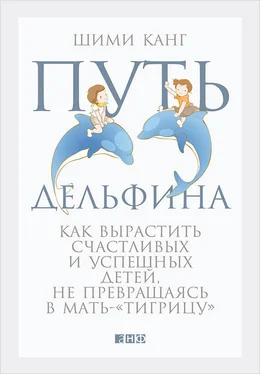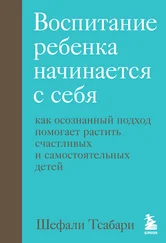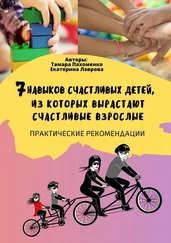Elkind D. “Can We Play?” Greater Good , March 1, 2008.
Azar B. “Its More Than Fun and Games,” Monitor on Psychology 33, no. 3 (March 2002).
Cooper H., Robinson J. C. and Patall E. A. “Does Homework Improve Academic Achievement? A Synthesis of Research, 1987–2003,” Review of Educational Research 76, no. 1 (2006).
Louv R. Last Child in the Woods. New York: Algonquin Books of Chapel Hill, 2005.
Ryan R. M., Weinstein N., Bernstein J., Brown K. W., Mistretta L. and Gagne M. “Vitalizing Effects of Being Outdoors and in Nature”, Journal of Environmental Psychology 30, no. 2 (June 2010).
Cramb A. “Jogging in Forest Twice as Good as Trip to Gym for Mental Health,” Telegraph , June 20, 2012.
Dyer J., Gergersen H. and Christensen C. M. “Five Discovery Skills that Distinguish Great Innovators,” Working Knowledge, Harvard Business School, July 20, 2011.
Wolf G. “Steve Jobs: The Next Insanely Great Thing,” Wired , February 1996.
Глава 7
Caney M. “Dolphins Helping Humans,” Dolphin Way , April 12, 2011.
Young E. “Dolphin Mums Need Help from Their Friends,” Australian Geographic , November 2, 2010.
MacDonald G. and Leary M. R. “Why Does Social Exclusion Hurt? The Relationship between Social and Physical Pain,” Psychological Bulletin 131, no. 2 (2005).
Yates D. “Researchers Look for Ingredients of Happiness around the World”. News Bureau Illinois, June 29, 2011.
Dunn E. W., Aknin L. B. and Norton M. I. “Spending Money on Others Promotes Happiness,” Science (March 2008): 1687–1688.
Rico D. “The Science of Giving: Why Giving Feels So Good”, Huffington Post , January 11, 2012.
Moll J., Krueger F., Zahn R., Pardini M., de Oliveira-Souza R., Grafman J. “Human Fronto-Mesolimbic Networks Guide Decisions about Charitable Donation”, Proceedings of the National Academy of Sciences of the United States of America 103, no. 42 (2006).
Shulevitz J. “The Lethality of Loneliness.” New Republic , May 13, 2013.
Fromm-Reichmann F. Loneliness. Washington, WA: White Psychiatric Foundation, 1969.
Eisenberger N., Jarcho J. M., Lieberman M. and Naliboff B. D. “An Experimental Study of Shared Sensitivity to Physical Pain and Social Rejection,” Pain 126 (2006).
Sankar Y. “Character Not Charisma Is the Critical Measure of Leadership Excellence”, Journal of Leadership and Organizational Studies 9, no. 4 (2003).
Creswell J. D., Welch W. T., Taylor S. E., Sherman D. K., Greunewald T. L. and Mann T. “Affirmation of Personal Values Buffers Neuroendocrine and Psychological Stress Responses,” Psychological Science 16 (2005).
Emmons R. A. Thanks! How the New Science of Gratitude Can Make You Happier. New York: Houghton Mifflin, 2007.
Глава 8
Niaraki F. R. and Rahimi H. “The Impact of Authoritative, Permissive and Authoritarian Behavior of Parents on Self-concept, Psychological Health and Life Quality”, European Online Journal of Natural and Social Sciences (January 2, 2013).
Глава 9
Kang M. J., Hsu M., Krajbich I. M., Loewenstein G., McClure S. M., Wang J. T. and Camerer C. “The Wick in the Candle of Learning: Epistemic Curiosity Activates Reward Circuitry and Enhances Memory,” Psychological Science , 20, no. 8 (2009).
Dominus S. “Is Giving the Secret to Getting Ahead?” International New York Times , March 27, 2013.
Lipman J. “Why Tough Teachers Get Good Results,” Wall Street Journal , September 27, 2013.
Bergland C. “The Athlete’s Way”, Psychology Today , December 26, 2011.
Levine M. “Raising Successful Children,” International New York Times , August 4, 2012.
Dweck C. S. Mindset: The New Psychology of Success. New York: Random House, 2006.
“Carol Dweck, Stanford University Professor, On Why Telling Your Children They’re Smart Is Actually Bad for Them,” Huffington Post , August 2, 2013.
Глава 10
Laboy S. “Dolphins Problem-Solve Like Humans, New Study Shows (Video), Huffington Post , August 9, 2013.
Dyer J. H., Gregerson H. B. and Christenen C. M. “The Innovator’s DNA,” Harvard Business Review , December 2009.
Epstein R. The Big Book of Creativity Games. New York: McGraw-Hill, 2000.
Fredrickson B. L. Positivity. New York: Random House, 2009.
Breen B. “The 6 Myths of Creativity,” Fast Company , December 2004.
Hardy C. L. and Van Vugt M. “Nice Guys Finish First: The Competitive Altruism Hypothesis,” Personality and Social Psychology Bulletin 32, no. 10 (2006).
Batcho K. “Childhood Happiness: More Than Just Child’s Play”, Psychology Today , January 13, 2012.
Brickman P., Coates D. and Janoff-Bulman R. “Lottery Winners and Accident Victims: Is Happiness Relative?” Journal of Personality and Social Psychology 36, no. 8 (1978).
Rodin J. and Langer J. E. “Long-Term Effects of a Control-Relevant Intervention with the Institutionalized Aged”, Journal of Personality and Social Psychology 35, no. 12 (1997).
United Nations, World Happiness Report 2013. New York: United Nations, 2013, http://unsdsn.org/files/2013/09/WorldHappinessReport2013_online.pdf.
Blanchflower D. G. and Oswald A. J. “Well-being over Time in Britain and the USA,” Journal of Public Economics 88 (2004).
Глава 11
Brown H. “The Other Brain Also Deals with Many Woes,” International New York Times , August 23, 2005.
Hadhazy A. “Think Twice: How the Gut’s ‘Second Brain’ Influences Mood and Well-Being” Scientific American , February 12, 2010.
“Intuitive Policing: Emotional / Rational Decision Making in Law Enforcement,” FBI Law Enforcement Bulletin, February 2004, 1.
Gray P. “Why Children Protest Going to School: More Evo. Mismatch”, Psychology Today , November 10, 2011.
Феромоны – летучие гормоны, которые выделяет наше тело. – Прим. авт.
Гладуэлл М. Гении и аутсайдеры. Почему одним все, а другим ничего? – М.: Юнайтед Пресс, 2010.
TED (от англ. Technology Entertainment Design – технологии, развлечения, дизайн) – частный некоммерческий фонд в США, известный прежде всего своими ежегодными конференциями, проводящимися с 1984 г. Миссия конференций состоит в распространении уникальных идей, избранные лекции доступны на веб-сайте конференции. Темы лекций разнообразны: наука, искусство, дизайн, политика, культура, бизнес, глобальные проблемы и т. д. – Прим. ред.
Английский термин «mindfulness». В русскоязычной буддистской и индуистской литературе и практике переводится также как «бдительность» или «памятование». – Прим. пер.
Лоув. Р. Последний ребенок в лесу. – М.: Добрая книга, 2007.
Читать дальше
Конец ознакомительного отрывка
Купить книгу












